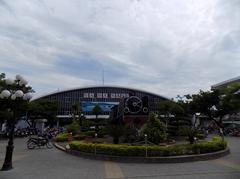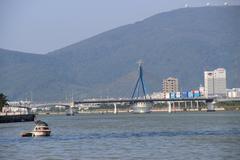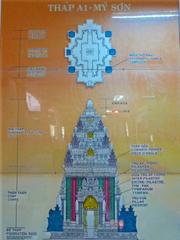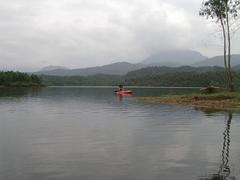
Dien Hai Citadel Visiting Hours, Tickets, and Da Nang Historical Sites Guide
Date: 04/07/2025
Introduction to Dien Hai Citadel
Located in the heart of Da Nang, Vietnam, Dien Hai Citadel is a monument to the nation’s resilience and military ingenuity. First constructed in 1813 during the Nguyen Dynasty under Emperor Gia Long, it was strategically designed to protect Da Nang’s vital port from maritime threats as Western colonial ambitions intensified (danang365.com). Over time, the citadel was restructured in the Vauban style—a European fortification system featuring star-shaped bastions and thick stone walls—demonstrating Vietnam’s adaptation to evolving military technologies (danangfantasticity.com; Vietnam National Administration of Tourism).
Dien Hai Citadel played a pivotal role in resisting colonial invasions, notably withstanding the French-Spanish assault in the mid-19th century under General Nguyen Tri Phuong (originvietnam.com). Today, visitors can explore its robust walls, preserved cannons, and monuments, making it a rich cultural and educational destination. This guide provides essential information on visiting hours, ticketing, accessibility, highlights, and nearby attractions, ensuring a rewarding experience at this significant site (danang365.com).
Table of Contents
- Origins and Historical Background
- Architectural Features and Military Design
- Resistance and Historical Role
- Visiting Hours and Ticket Information
- Accessibility and Visitor Tips
- Exhibits and Artifacts
- Special Events and Seasonal Activities
- Nearby Attractions
- Preservation and Recognition
- Frequently Asked Questions (FAQ)
- Summary and Further Reading
Origins and Historical Background
Dien Hai Citadel was originally built in 1813 near the Han River estuary to safeguard Da Nang and its port (danang365.com). Due to coastal erosion, the fortress was moved inland to an elevated position in 1823 by Emperor Minh Mang. In 1834, it was officially named Dien Hai Citadel, and in 1847, Emperor Thieu Tri oversaw its expansion and the adoption of the Vauban defensive style (danangfantasticity.com).
Architectural Features and Military Design
The citadel’s Vauban design includes a square layout with bastions at each corner, thick stone walls over 5 meters high, and moats over 3 meters deep (danangprivatecar.com). Originally, it had four gates, but today, the main southern gate is the most prominent. Inside, there were command headquarters, armories, barracks, and storage. The site was armed with around 30 large cannons, some weighing up to 3 tons and measuring 2.8 meters in length (originvietnam.com). These features exemplify the adaptation of Vietnamese military architecture to resist increasingly sophisticated threats.
Resistance and Historical Role
Dien Hai Citadel became central to Vietnam’s defense during the 1858 French-Spanish invasion. General Nguyen Tri Phuong led the resistance, and the fortress withstood attacks for nearly two years, delaying French advances and earning a lasting legacy of resilience (danangfantasticity.com; originvietnam.com). The citadel continued to symbolize resistance through subsequent conflicts, including during the American War.
Visiting Hours and Ticket Information
- Opening Hours: Daily, 7:30 AM – 5:30 PM. Hours may vary during public holidays or events (Da Nang Tourism).
- Tickets: Adults: 20,000 VND; children under 12 and seniors over 65: discounted or free. Group discounts may be available.
- Where to Buy: At the visitor center or ticket office, with cash, credit card, or mobile payment options.
Accessibility and Visitor Tips
- Getting There: Located at 24 Tran Phu Street, Hai Chau District; accessible by taxi, bus, or on foot from the city center (Vietnam Tourism).
- Facilities: Wheelchair-accessible paths and ramps, restrooms, drinking stations, shaded seating, and a gift shop.
- Best Time to Visit: February–May for pleasant weather; early mornings or late afternoons for cooler temperatures and fewer crowds (Weather Spark).
- Dress Code: Modest clothing recommended; comfortable shoes advised.
- Safety: Site is monitored by security staff and CCTV; visitors should exercise caution around unrestored areas.
Exhibits and Artifacts
The citadel’s museum showcases historical cannons, weapons, uniforms, and documents from the colonial resistance period. Interactive displays and multimedia presentations provide context, while the statue of General Nguyen Tri Phuong commemorates the site’s defenders (originvietnam.com).
Special Events and Seasonal Activities
Dien Hai Citadel hosts historical reenactments, exhibitions, and cultural programs during major holidays, such as National Day (September 2) and the citadel’s defense anniversary (August 31). Event schedules are posted at the visitor center and on the official Da Nang events page (Da Nang Events).
Nearby Attractions
Enhance your visit by exploring:
- Han River Bridge: Iconic symbol of Da Nang.
- Da Nang Museum: In-depth local history and culture.
- Museum of Cham Sculpture: Artifacts of the ancient Champa civilization.
- Dragon Bridge and Han Market: Vibrant city experiences.
Preservation and Recognition
Dien Hai Citadel was designated a national historical monument in 1976 and a national historical relic in 1998 (danangprivatecar.com). Restoration projects continue to reinforce the walls, restore the moat, and conserve cannons. The site is managed by the Da Nang Museum, with information on current projects displayed at the visitor center.
Frequently Asked Questions (FAQ)
Q: What are the opening hours?
A: 7:30 AM–5:30 PM daily.
Q: How do I buy tickets?
A: At the visitor center or ticket office; cash, card, and mobile payments accepted.
Q: Is the site wheelchair accessible?
A: Yes, most areas have paved paths and ramps.
Q: Are guided tours available?
A: Yes, in Vietnamese and English, at 9:00 AM, 11:00 AM, and 3:00 PM.
Q: Can I take photos?
A: Yes, except where restricted inside the museum.
Summary
Dien Hai Citadel is an invaluable cultural and historic landmark in Da Nang, embodying centuries of Vietnam’s military heritage and tenacity (danang365.com; danangfantasticity.com). With its preserved Vauban-style architecture, evocative cannons, and thoughtful curation, the citadel offers visitors both a journey into the past and a vibrant educational experience. Managed by the Da Nang Museum and supported by ongoing restoration, Dien Hai Citadel remains a must-visit destination for understanding Vietnam’s historical fabric (danangprivatecar.com; originvietnam.com).
Stay informed about opening hours and special events by consulting official tourism resources, and consider downloading the Audiala app for immersive tours and updates.
References and Further Reading
- Dien Hai Citadel Visiting Hours, Tickets, and Historical Guide to Da Nang’s Iconic Fortress, 2023, Danang365 (danang365.com)
- Dien Hai Citadel Historical and Cultural Information, 2024, Danang Fantasticity (danangfantasticity.com)
- Dien Hai Citadel Relics in Da Nang, 2023, Danang Private Car (danangprivatecar.com)
- Dien Hai Citadel Details, 2023, Origin Vietnam (originvietnam.com)
- Vietnam National Administration of Tourism, Dien Hai Citadel Overview, 2023 (Vietnam National Administration of Tourism)







